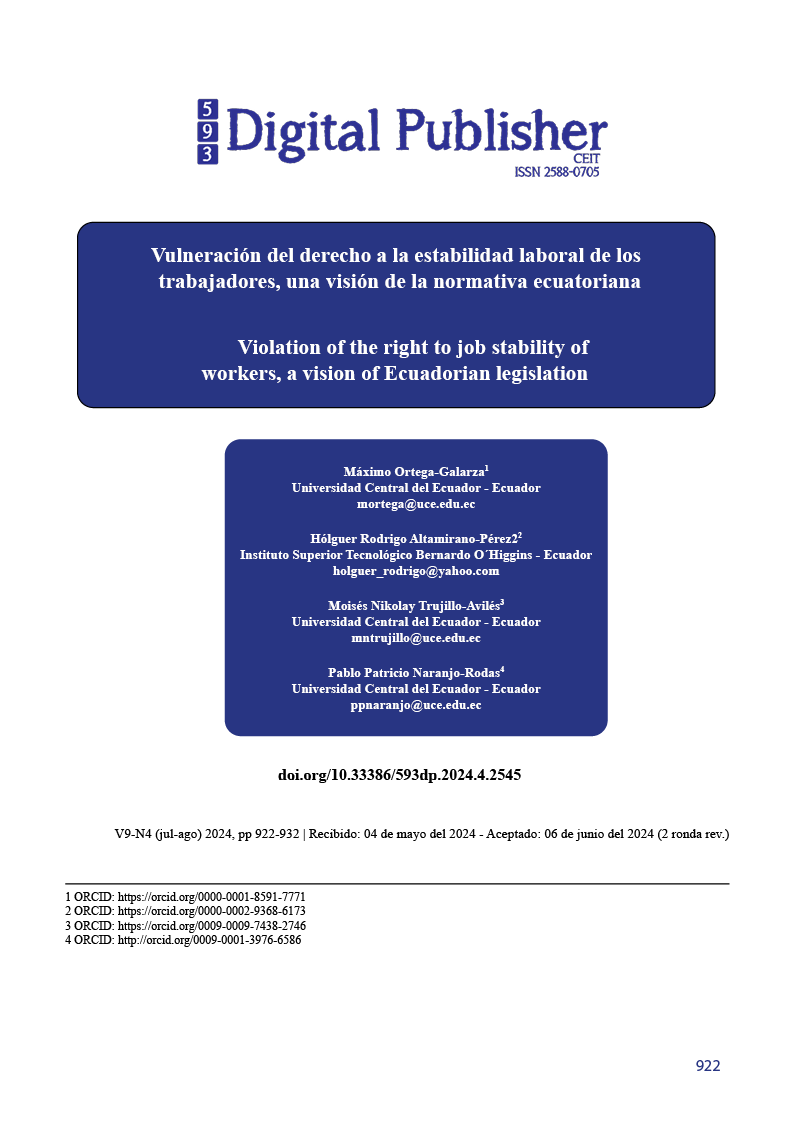Violation of the right to job stability of workers, a vision of Ecuadorian legislation
Main Article Content
Abstract
The effects of the COVID-19 pandemic affected the stability of workers due to the levels of confinement and, in addition to this, the creation of the Organic Law of Humanitarian Support increased the differences among workers. The general objective was to determine the violation of the workers' right to labor stability through the application and interpretation of the regulations, using for this purpose as a fundamental methodology the qualitative approach under the type of descriptive and documentary research, following a theoretical-explanatory line in the review of material that supports the research such as theses, scientific articles, national newspapers and legal bodies. The methods that allowed the explanation of this critical analysis were deductive, historical and logical. The main result of the research determined that there was a violation of workers' rights, violating the principle of labor stability, as a result of the application of article 169 numeral 6 of the Labor Code, which meant untimely dismissals and the application of the Organic Law of Humanitarian Support by reducing working hours and salary, which caused a negative impact on workers in the economic sense and, according to other authors, in the psychological aspect.
Downloads
Article Details

This work is licensed under a Creative Commons Attribution-NonCommercial-ShareAlike 4.0 International License.
1. Derechos de autor
Las obras que se publican en 593 Digital Publisher CEIT están sujetas a los siguientes términos:
1.1. 593 Digital Publisher CEIT, conserva los derechos patrimoniales (copyright) de las obras publicadas, favorece y permite la reutilización de las mismas bajo la licencia Licencia Creative Commons 4.0 de Reconocimiento-NoComercial-CompartirIgual 4.0, por lo cual se pueden copiar, usar, difundir, transmitir y exponer públicamente, siempre que:
1.1.a. Se cite la autoría y fuente original de su publicación (revista, editorial, URL).
1.1.b. No se usen para fines comerciales u onerosos.
1.1.c. Se mencione la existencia y especificaciones de esta licencia de uso.
References
Almeida, G. E. (2021). ¿Es insuficiente la disposición interpretativa del caso fortuito o fuerza mayor como causal de terminación del contrato de trabajo en la Ley Orgánica de Apoyo Humanitario? Un análisis desde el Derecho comparado con ocasión del Covid-19. USFQ Law Review, 8(1), 01–25. https://doi.org/10.18272/ULR.V8I1.2024
Asamblea Constituyente. (2008, octubre 20). Constitución de la República del Ecuador. R.O. 449. https://www.defensa.gob.ec/wp-content/uploads/downloads/2021/02/Constitucion-de-la-Republica-del-Ecuador_act_ene-2021.pdf
Asamblea Nacional del Ecuador. (2005, diciembre 16). Codificación del Código del Trabajo. R.O. 242. https://www.defensa.gob.ec/wp-content/uploads/downloads/2023/03/Codigo-de-Trabajo_feb_2023.pdf
Asamblea Nacional del Ecuador. (2020). Ley Orgánica de Apoyo Humanitario. R.O. 229. www.lexis.com.ec
Banco Interamericano de Desarrollo. (2022). Impacto del COVID-19 en el mercado laboral: ¿Qué ha pasado desde la crisis económica, y qué sigue? https://blogs.iadb.org/trabajo/es/el-mercado-laboral-desde-el-covid-19/
Barrios, C. del C., Criado, M., Estupiñán, L., Leiva, E., Novoa, M. L., Pabón, A. P., y Parra, D. T. (2021). Manual de Metodología de Investigación Jurídica para la Práctica Judicial en la Escuela Judicial “Rodrigo Lara Bonilla” (Consejo Superior de la Judicatura, Ed.). https://escuelajudicial.ramajudicial.gov.co/sites/default/files/Manua%20Enero%202022.pdf
Betancourt, D. Q., y Rodríguez, J. M. (2022). La afectación del Covid-19 en el empleo adecuado femenino en Ecuador. Revista de la Facultad de Ciencias Económicas, 4(4), 79–108. https://doi.org/10.53591/fce.v4i4.1853
Congreso Nacional. (2020). Código del Trabajo. R.O. 167. https://www.lexis.com.ec/biblioteca/codigo-trabajo
Corte Constitucional del Ecuador. (2021, diciembre 1). Sentencia No. 23-20-CN y Acumulados/21. http://esacc.corteconstitucional.gob.ec/storage/api/v1/10_DWL_FL/e2NhcnBldGE6J3RyYW1pdGUnLCB1dWlkOicwY2VkZDc0MS1lNTAyLTRlYWEtOTJlNS1jM2U2MTYwYTA0NjAucGRmJ30=
Corte Nacional de Justicia. (2008). Juicio Laboral. En No. 543.
Diario Expreso. (2020, abril 30). Coronavirus: La cuarentena liquidó a las pequeñas empresas. https://www.expreso.ec/actualidad/cuarentena-liquido-pequenas-empresas-coronavirus-10344.html
Diario La Hora. (2022, abril 18). La pandemia acabó con 11.840 pequeñas empresas. https://www.lahora.com.ec/pais/efecto-pandemia-pequenas-empresas/
El Comercio. (2020). Quejas por despidos y vulneración de derechos laborales crecen en Ecuador. https://www.elcomercio.com/actualidad/negocios/denuncias-vulneracion-derechos-laborales-despidos.html
El Universo. (2020a, abril 21). Casi dos mil denuncias por terminación de contrato alegando “caso de fuerza mayor” se registran en Ecuador. https://www.eluniverso.com/noticias/2020/04/20/nota/7818459/terminacion-contrato-fuerza-mayor-fortuito-denuncias-despidos/
El Universo. (2020b, mayo 1). Un 1 de mayo sin marchas y con casi 50 000 nuevos desempleados en Ecuador. https://www.eluniverso.com/noticias/2020/04/30/nota/7827954/dia-trabajo-cacerolazo-protesta-despidos-trabajadores-coronavirus/
Escobar, E. D., y Arroba, D. A. (2022). La carga de la prueba en el despido intempestivo. Conciencia Digital, 5(3), 25–47. https://doi.org/10.33262/concienciadigital.v5i3.2201
Esteves, A. (2020). El impacto del COVID-19 en el mercado de trabajo de Ecuador. Revista Latinoamericana de Políticas y Acción Públicas, 7(2), 35–41. https://revistas.flacsoandes.edu.ec/mundosplurales/article/view/4875/3680
Marcial, S. (2008). La propina como componente salarial. Revista Derecho Del Trabajo, 119–170. https://vlexvenezuela.com/vid/propina-componente-salarial-402810718
Molina, A. (2007). Aproximaciones sobre el derecho al trabajo desde la perspectiva de los derechos humanos. Estudios Socio-Jurídicos, 9, 166–189.
Organización de las Naciones Unidas. (2023). La Declaración Universal de los Derechos Humanos. United Nations. https://www.un.org/es/about-us/universal-declaration-of-human-rights
Organización Internacional del Trabajo. (2020a). Panorama Laboral en tiempos de la COVID-19. https://webapps.ilo.org/wcmsp5/groups/public/---americas/---ro-lima/documents/publication/wcms_749659.pdf
Organización Internacional del Trabajo. (2020b, julio 1). OIT: Fuerte aumento del desempleo en América Latina y el Caribe deja a millones sin ingresos. http://www.ilo.org/americas/sala-de-prensa/WCMS_749663/lang--es/index.htm
Organización Panamericana de la Salud. (2020). Acuerdo No 00126-2020 Emergencia Sanitaria Sistema Nacional de Salud - Ecuador. https://paho-covid-prod.atmire.com/handle/20.500.12663/542
Paguay, M. Á., y Morales, M. A. (2023). La estabilidad laboral en el Ecuador. Revista Científica de la Universidad de Cienfuegos, 15(2), 346–354. http://scielo.sld.cu/pdf/rus/v15n2/2218-3620-rus-15-02-346.pdf
Pedraza, E., Amaya, G., y Conde, M. (2010). Desempeño laboral y estabilidad del personal administrativo contratado de la Facultad de Medicina de la Universidad del Zulia. Revista de Ciencias Sociales, 16(3), 493–505. http://ve.scielo.org/scielo.php?script=sci_arttext&pid=S1315-95182010000300010&lng=es&nrm=iso&tlng=es
Piñas, L. F., Viteri, B. D. C., y Álvarez, G. F. (2021). Vista de El despido intempestivo y el derecho al trabajo en Ecuador en tiempo de COVID 19. Revista Dilemas Contemporáneos: Educación, Política y Valores, 11, 1–22. https://dilemascontemporaneoseducacionpoliticayvalores.com/index.php/dilemas/article/view/2690/2717
Primicias. (2020, noviembre 13). Más de 37.000 denuncias laborales registradas en el Ministerio de Trabajo. https://www.primicias.ec/noticias/economia/denuncias-registradas-ministerio-trabajo/
Primicias. (2021, julio 9). Comercio y manufactura, los sectores más golpeados por la pandemia. https://www.primicias.ec/noticias/economia/sectores-economia-golpeados-pandemia-ecuador/
Primicias. (2022, abril 4). Denuncias laborales bajan un 65%, pero aún superan niveles prepandemia. https://www.primicias.ec/noticias/economia/denuncias-laborales-ecuador-pandemia-ministerio/
Riofrio, T. C. (2023). El daño moral causado por el despido intempestivo discriminatorio en el Ecuador [Tesis de tercer nivel]. Universidad Nacional de Chimborazo.
Villacrés, J., y Jaramillo, A. A. (2022). El daño moral a consecuencia del despido intempestivo. Sociedad y Tecnología, 5(S1), 1–16. https://doi.org/10.51247/ST.V5IS1.229
Weller, J. (2020). La pandemia del COVID-19 y su efecto en las tendencias de los mercados laborales (Naciones Unidas, Ed.). www.cepal.org/apps
Zambrano, A. D. (2021). La aplicación del artículo 169 numeral 6 del Código de Trabajo en tiempos de pandemia y su incidencia en el despido intempestivo [Tesis de tercer nivel, Universidad Regional Autónoma de los Andes]. https://dspace.uniandes.edu.ec/bitstream/123456789/14347/1/UB-DER-PDI-002-2022.pdf





